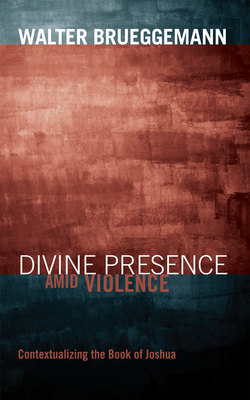Читать книгу Divine Presence amid Violence - Walter Brueggemann - Страница 8
На сайте Литреса книга снята с продажи.
2 Discerning Revelation from God
ОглавлениеTo pursue this matter of “revelation in context,” I will address an exceedingly difficult text in the Old Testament, Joshua 11. The reason for taking up this text is to deal with the often asked and troublesome question: What shall we do with all the violence and bloody war that is done in the Old Testament in the name of Yahweh?1 The question reflects a sense that these texts of violence are at least an embarrassment, are morally repulsive, and are theologically problematic in the Bible, not because they are violent, but because this is violence either in the name of or at the hand of Yahweh.
The questions we shall consider are the following: How are these texts of violence to be understood as revelation? What is it that is disclosed? And how shall this disclosure be received as serious, authoritative, and binding as the only rule for life and faith? We shall consider the revelatory question in two dimensions. The first is revelation within the text. What has drawn me to Joshua 11 is the awareness that within the text as such very little, surprisingly little, is directly assigned to Yahweh as revelation. So we ask how the characters in this text discerned God’s revelation. Second, we shall go on to ask about how the whole of the text is taken as revelation, once the text is stabilized for us. It may well be that this distinction will be useful in understanding how this text should be handled in faith communities that celebrate revelation but flinch from violence linked to God. The warrant for violence within the text may yield a very different disclosure when we take the text as a stable revelatory unit. In our text, what Joshua and ancient Israel took as revelation may provide a clue for our hearing the text as revelatory. But the two may not be identified or equated.
It is clear that this text, like every biblical text, has no fixed, closed meaning; it is inescapably open to interpretation that reflects specific circumstance and location. In this case, the Joshua material in the thirteenth century (if the text were that old) may have “revealed” a divine intent about “conquest.” But in the fifth century, the likely time of the final form of the text, the revelatory dimension would have been read with much less attention to the raw assertion of divine agency through violence against the Canaanites. In our own time, moreover, these texts may assert divine resolve and intentionality, but very many readers cringe from the divine readiness for violence. Thus, whatever is taken as revelatory in this text in our circumstance, it is certain that the articulation of divine violence is an acute awkwardness. Very often interpretation labors to “explain away” such a characterization of God, not least because contemporary interpreters are increasingly aware of the abusive character of much religion in the name of God. The revelatory claim for the text may be that this God wills for God’s chosen that they should not be landless in the world. But that claim in contemporary context is fraught with immense problems. As Regina Schwartz has argued, the very notion of “chosenness” carries with it implications of violence that remain definingly problematic.2 For that reason our contemporary interpretation of such texts must be knowing about our own time and place. The text cannot be taken as an absolute outside of time, but is always drawn into particular time and place by the act of interpretation.
We may begin with a summary of some standard critical observations.3 The first half of the book of Joshua (chapters 1–12) concerns the conquest of the land, which is ordered by God. Chapters 13–22 concern the division of the land, ordered by Joshua. The book of Joshua is a theological account in which God acts directly as an agent in the narrative. Within Joshua 1–12, the specific narrative accounts concern
• 2 and 6: the conquest of Jericho
• 3 and 4: the crossing at Gilgal
• 5: the institution of circumcision
• 7 and 8:1–29: the crisis of Achan and Ai
• 8:30–35: the altar on Mt. Ebal near Shechem
• 9: the subservience of the Gibeonites
• 10: the taking of the south.
Albrecht Alt has suggested that these narratives conclude with etiological formulas that evidence that they were originally teaching tales to justify present phenomena. He has observed that these etiological narratives tend to be located in a narrow geographical range with particular reference to the tribal area of Benjamin.4
